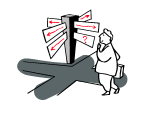
1. You have a right to have an advocate:
You have the right to have an advocate when you are talking with people from the NDIS.
An advocate is an independent person who can support you.
Your advocate should be someone you feel comfortable with, trust and who can help you understand your rights.
Your advocate should be someone who will help you stand up for your rights.

2. You have a right to make a complaint if you disagree with decisions the NDIS makes
If you are not happy with a decision made by the staff at the NDIS, you can make a complaint.
If you are not happy with how the staff treat you at the NDIS, you can make a complaint.
When you make a complaint, you should first tell the staff at the NDIS. They then should listen to your complaint and decide what to do next.
If you don’t agree with the changes or review of your complaint, you can then go to a place called the AAT. The government has given the AAT the authority to make a final decision about your complaint.
If you want to make a complaint about anything to do with the NDIS, you should ask an advocate for advice or help.

3. You have a right to expect people to do what they say they’ll do
If a staff member at the NDIS says they will do something to help you, you have a right to expect them to do it.
If a staff member at another service provider says they will do something to help you, you have a right to expect them to do it.
If they don’t do what they say they will do, you should talk to an advocate about what to do.

4. You have a right to expect service providers to give you good support.
The law says service providers must help you to meet your goals in your plan.
The law also says service providers must support you be part of the community.
The law also says service providers must do their job well.
If you don’t think a service provider is doing any of these things, you can talk to an advocate about it.
If you make a complaint about the service provider, this could mean that the service provider learns how to do a better job.
You have the right to choose another service provider to help and support you if you are not happy.

5. You have a right to make your own decisions.
You have a right to make your own decisions about what sort of support you receive from the NDIS.
You have a right to expect the staff at the NDIS to give you information in a way that you can understand, so you can make a decision about what sort of support you want.
You have a right to get support, if you need it, to help you make decisions.
You can get this support from someone you trust.
If the NDIS staff organise for someone to support you in making decisions, but you are not happy with the person, you have the right to ask for someone else to support you.
Anyone who supports you to make decisions about the NDIS should always respect your choices. They should never take over. It’s YOUR decision.

6. You have a right to be treated equally.
You have the right to be treated fairly and equally – the same as those without disability.
It also says that if you need extra help or support because of your disability, you should be able to get it.
This means that you have a right to expect that everything explained to you is in a way that you understand.
It means that you have a right to take extra time to make decisions, if you need it.
It means you have a right to have a friend or advocate support you whenever you need it.
It means the staff should do whatever they can to make sure you can participate in the NDIS as fully as anyone else can.

7. You have a right get support from the NDIS.
The law says that if you have a disability, and the disability makes it difficult for you to live the life you want to lead, you should be able to get support from the NDIS.
If the NDIS staff don’t think you have a disability, but you think you do, you should talk to an advocate. The advocate may be able to help you explain to the NDIS staff more about your disability.

8. You have a right to information in a form you can understand.
You have a right to ask the NDIS staff to explain the information to you.
You have a right to ask the NDIS staff to give you the information in a format that you can understand (ie. easy English).
You have a right to ask for extra time to help you understand the information.
You have a right to have an advocate or support person help you understand the information. You have a right to choose who that person will be.

9. You have a right to get the support you need and want
The NDIS says that you should get the support you need.
You have a right to the support that will help you meet your goals in your plan.
You have a right to the support that will help you be part of the community.
If the NDIS staff don’t agree with you about how much support you should get, or about who you can get it from, you should ask an advocate to help you. The advocate may be able to help get the NDIS staff to change their mind.
If the NDIS staff say that the support you need is not available, an advocate may be able to give you some other advice about getting extra information/supports to meet your needs.
Click to view the NDIS website.
Click to download our NDIS and Advocacy Rights consumer brochure.
